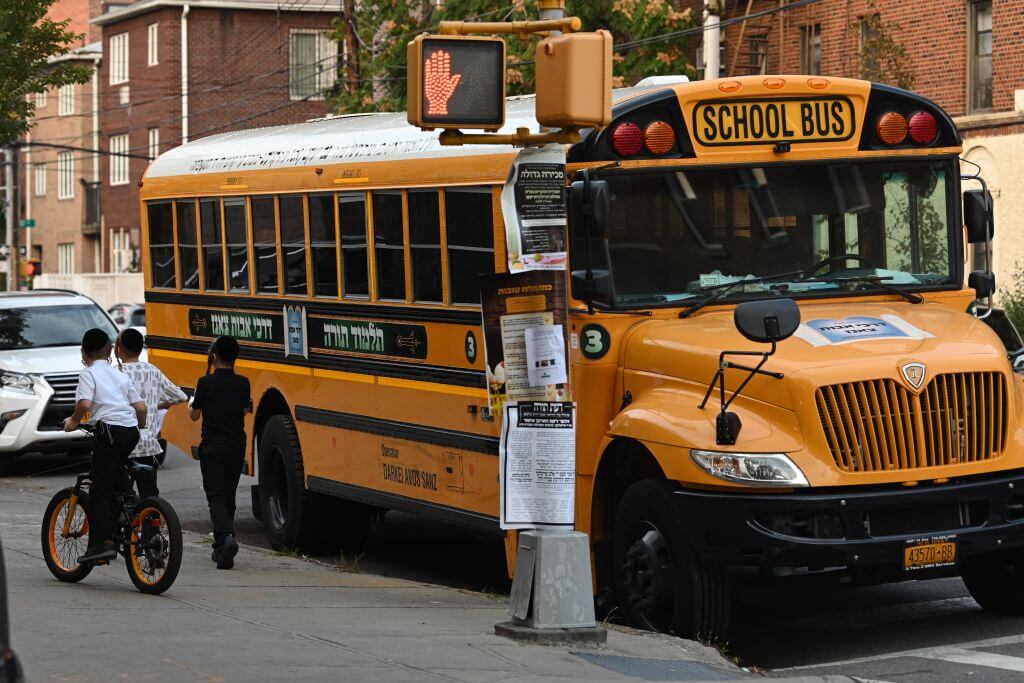New York set to strengthen oversight of secular studies at Orthodox schools
The Board of Regents’ vote on new regulations that would require private schools to meet substantial equivalence instruction has ignited a heated debate

People walk past a yeshiva school bus in Borough Park on September 25, 2020. Photo by Alexi Rosenfeld/Getty Images
New York’s Board of Regents will vote this week on a proposal that would allow the state to reject a yeshiva’s secular curriculum, a move that was met with immediate pushback by Orthodox leadership who called it “deeply disappointing.”
The education department released the guidelines in March after yearslong debate over how much government oversight should be allowed in private schools to demonstrate they meet curriculum standards substantially equivalent to public schools as required by New York state law. The New York Times published on Sunday a monthslong investigation of Hasidic yeshivas in Brooklyn and the lower Hudson Valley, documenting widespread failures in basic secular subjects despite benefiting from $1 billion in government funding. Among its findings were that 99% of the yeshiva students who took state standardized tests failed.
According to the Avi Chai Foundation, which surveys Jewish day school education in the United States every five years, there were 337 Jewish schools in New York City, with an additional 147 in the suburbs in 2018.
Yaffed, a pro-secular education group founded by former yeshiva students and parents, alleged in 2015 that at least 39 yeshivas in New York City were providing limited secular education. A New York City Department of Education report in 2019 found that only two of the 28 yeshivas investigated met the required amount of secular education in subjects such as English and science.
The state’s department of education said the regulations published on Friday ahead of this week’s vote will enable private schools to comply with the law “while also maintaining their unique culture and beliefs in the delivery of instruction.” Schools that refuse to comply and local school districts that fail to monitor the private schools in their boundaries could lose state funding.
During the public comment period earlier this year, Orthodox schools and other advocacy groups submitted petitions in hopes of influencing members of the board.
Dan Morton-Bentley, a counsel and deputy commissioner at the education department said during a briefing with Orthodox media outlets on Friday that of the more than 350,000 comments that were submitted, the “vast majority” of them “expressed philosophical opposition” to state oversight.
An Orthodox group that campaigned heavily in opposition to the regulations, the Parents for Educational and Religious Liberty in Schools — or PEARLS, said in a statement that a “government checklist, devised by lawyers and enforced by bureaucrats, hampers rather than advances education.”
Jim Baldwin, the senior deputy commissioner for education policy, maintained that the regulations do not single out any particular group and it doesn’t regulate religious instruction. “The regulation does not mandate specific curriculum or courses other than those that are required by New York State statute,” he said.
A political issue in the gubernatorial race
The Hasidic population, roughly 10 percent of the state’s Jewish population, is an important voting bloc.
Rep. Lee Zeldin, the Republican nominee for governor, said he strongly opposes the regulations and criticized the incumbent Democratic governor, Kathy Hochul, for being silent on the issue and “refusing to show even an ounce of courage or leadership.”
In a recent interview, Hochul maintained that “it has nothing to do with the governor’s office” since the state’s commissioner, Betty Rosa, is selected by the trustees who are appointed by the legislature.
Hochul said that while there’s always room for improvement, “the outcomes of the vast majority of yeshivas are very positive. People are getting outstanding education.” She added that she is committed to increasing funds to programs that can help “bolster the caliber of the education” and provide them the right amount of resources to achieve a higher level of education.

New York City Mayor Eric Adams pledged last year to work closely with the community to implement changes and fully enforce the law when needed and said he was impressed with the standards at Brooklyn yeshivas.
If the regulations are approved by the Board of Regents following its presentation on Monday it will become effective by the end of the month. Schools will have two months to demonstrate compliance. Schools that opt for a local school authority review will have until the end of school year 2024-2025 to be deemed to have substantially equivalent instruction. The commissioner has the authority to grant additional time if needed.
















